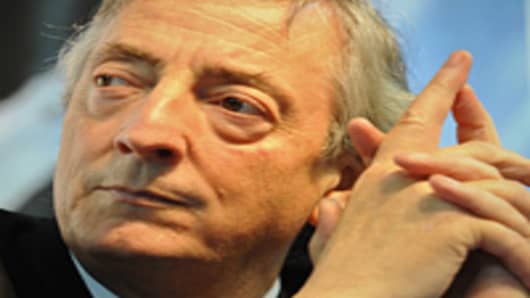The price of dollar-denominated Boden debt due in 2015 gained more than 3 percentage points.
“Investors are expecting regime change,” said Alberto Bernal, head of research at Bulltick Capital Markets in Miami.
Flags in Argentina flew at half-mast for the former president, who died of a heart attack on Wednesday at home in El Calafate, in southern Argentina. The country has declared three days of mourning.
Tributes poured in from across the political spectrum to a man who made many enemies but ruled with passionate conviction.
Barack Obama, US president, led a chorus of tributes from political leaders and Hugo Chávez, the Venezuelan leader who was for a time the main financial backer to a country cut off from international credit since its default on $100 billion in 2001, said: “We have lost a bastion, when he had so much to give.”
Supporters congregated outside the presidential palace in Buenos Aires, placing floral tributes, flags and messages. A mass was held at Buenos Aires cathedral.
Kirchner, who had been considering seeking a comeback in elections next October, was the driving force in what became Argentina’s most powerful political partnership since Juan and Evita Perón, and he was widely believed to have called the shots in the administration of Cristina Fernández, his wife. “This isn’t a government of president and ministers and a team – it was basically him,” said Daniel Kerner, a political analyst.
He expected public sympathy to give Ms Fernández a boost in the polls. But though Ms Fernández followed her husband’s economic model, she lacks his clout with power brokers, such as union leaders.
“She doesn’t have political weight on her own, far less within the Peronist party,” noted Joaquín Mor ales Solá, a commentator.
Nevertheless, Hugo Moyano, the powerful head of Argentina’s biggest union confederation, promised to rally support behind the president. “After Perón and Evita, no one did as much for workers,” he said.
“The bottom line is near-term volatility,” said Douglas Smith, head of Latin America research at Standard Chartered. “But I’d say this is somewhat positive for the bonds and the economic outlook because it boosts the chance of the opposition, which is more fiscally responsible and market friendly.”
Kirchner turned Argentina inward during his 2003-07 term. He alienated investors with unorthodox policies, including price controls and export freezes.
Galloping public spending and inflation expected to end the year above 25 per cent has led many to question the sustainability of the economic policies Kirchner bequeathed to his wife.
Ms Fernández, however, says high growth – as much as 8 per cent this year – vindicates her husband’s model. But opinion polls showed voters were already weary of the couple’s confrontational style.
This could open the way for a milder candidate to steer Argentina into a more investor-friendly era.
Additional reporting by Benedict Mander in Caracas


